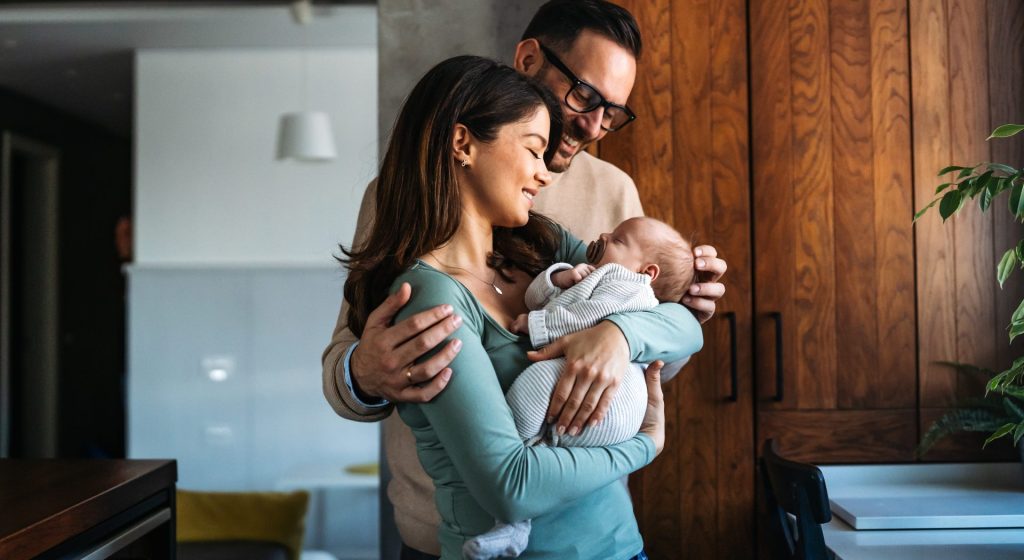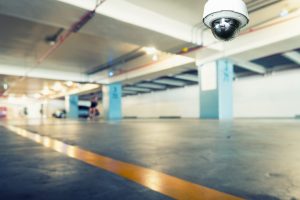Home security may never have been as important to you as it is now that you’re a parent. Effective security systems protect your family, property, and peace of mind by ensuring you always have eyes on your home. However, with the array of devices and options out there, determining your best solutions is often challenging.
We’ll discuss the most critical aspects of security for new parents to help you develop the best plan for your home.
Why Is Security for New Parents Important?
Advancing technology keeps creating new security capabilities for residential properties. As a parent, it’s vital to understand all the options and limitations of security systems to find the best safety solutions for your family. You can take some of the responsibility off yourself for better peace of mind — and you’ll be able to respond to emergencies faster when they arise.
Integrating multiple security layers into one system makes home security even easier by letting you access every alarm, camera, and sensor right from your phone. You can immediately check on motion alerts, arm the house as needed, and keep an eye on things while you’re away. Plus, with 24/7 monitoring, you can rest assured that a response team will check on alerts and contact the police when you can’t.
8 Essential Aspects of Home Security
While every setup differs, security for new parents starts with the following safety protocols.
1. Strategic Security Installation
When installing your security system, you must be attentive to each device’s capabilities and your property’s needs. For instance, be aware of blind spots, overlapping footage, and entry points when setting up exterior cameras. You should also consider the spatial limitations of glass sensors near windows and doors to make sure they can pick up audio.
Working with a trusted security provider, such as Alarm Detection Systems, ensures you don’t miss any vulnerabilities on your property. We can also recommend the best equipment and security solutions for your needs, letting you maximize every function.
2. Indoor and Outdoor Surveillance
Whether you use both indoor and outdoor cameras or only exterior surveillance may depend on your property, area, and preferences. Indoor cameras can provide additional security and eyes within your house, helping you monitor pets, kids, and more. Consider placing interior cameras near entryways and high-traffic areas, such as the hallway, garage, and nursery.
When installing cameras outdoors, focus on the following areas:
- Doorways, windows, and other entry points
- Front yard, facing the road
- Backyard and fence perimeter
- Driveways
- Near the top of the house, facing down
3. Exterior Lighting
While outdoor cameras can provide essential security and surveillance around your perimeter, your footage may be ineffective if your yard is unlit. Installing exterior lighting will improve your outdoor surveillance setup and allow it to pick up more details like faces and movement.
Even if you add only an extra light or two, you and your 24/7 monitoring teams can respond to alerts faster without guessing about shadows or blurry motion. Additionally, ample lighting on your property may ward off intruders just by being on, especially combined with video cameras and security warnings.
4. Secured Doors and Windows
Contacts and sensors for doors and windows provide multilayered security for your home’s entry points. For example, door contacts detect movement within your door frame so you always know when it’s opened. Meanwhile, glass break detectors listen for the sound of shattering glass to cover multiple entry points at once.
Consider using multiple sensors and contact devices when securing your home’s doors and windows. This will help you supervise your home’s entrances more comprehensively, often without a single camera.
5. Smoke and Carbon Monoxide Detection
While laws vary by state, almost all residential properties require smoke and carbon monoxide detectors, especially in sleeping areas. Always double-check your state and local laws before you install or update your smoke alarms to stay compliant.
After your property has enough smoke and carbon monoxide detectors, you should develop a maintenance plan. Most smoke detectors should be tested monthly to check their batteries and performance. Keep an eye on the age of your smoke detectors (they should be no more than 10 years old).
6. Baby Monitors
As many parenting books will tell you, baby monitors are among the best security essentials for keeping an eye on your kids and maintaining peace of mind. Most modern baby monitors connect to your phone, computer, and other devices for faster, easier access.
This way, you can depend on your phone for notifications and don’t need to carry an external monitor screen around the house. Some baby monitors can even connect to your other security systems to keep all of your surveillance solutions in one place.
7. Childproof Surfaces and Hazards
Childproofing your home seems to be a never-ending process of identifying risks, hazards, and new curiosities. Fortunately, there are several devices and tools you can invest in to improve your home’s overall safety for kids.
Consider the following childproof options:
- Door contacts for kids’ rooms
- Safety gates, especially near stairs
- Outlet covers
- Cord and cable protectors
- Cordless blinds
- Padding for sharp corners and edges
8. Frequent Maintenance
Many aspects of your home security setup may require frequent checks and maintenance. Fortunately, many battery-powered security devices, such as sensors and doorbell cameras, notify you through your security apps when they need charging.
However, you’ll need to check other security elements manually, from the device’s overall condition to camera visibility. Your maintenance may range from trimming bushes to testing alarms. Make a checklist as you install new security devices to develop monthly and annual maintenance schedules.
Upgrade Your Home Security With Alarm Detection Systems
As a new parent, your new responsibilities and priorities may be challenging to get used to, especially when securing multiple entrances. Family-owned since 1968, Alarm Detection Systems, Inc. specializes in identifying different properties’ needs and best solutions. We provide fire alarms, cameras, 24/7 monitoring, and other home security solutions to keep your family safe. Request a quote today to learn more.
About Alarm Detection Systems, Inc.
Alarm Detection Systems is one of the largest alarm firms in the country. Family-owned since 1968, we provide business alarms, fire alarms, card access, security cameras, and home security systems. Proudly servicing Chicagoland, Northern Illinois, Northwest Indiana, and Southern Wisconsin in the Midwest. Call us at 630.844.6300 for more information.
In Colorado, we service all of Denver, Boulder County, Northern Colorado, the Eastern Plains, and Colorado Springs. Call us at 1.800.446.7519 for more information.



